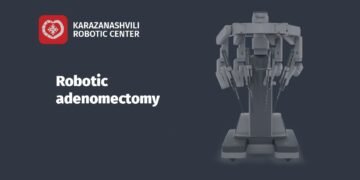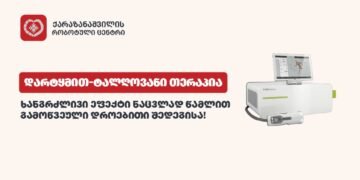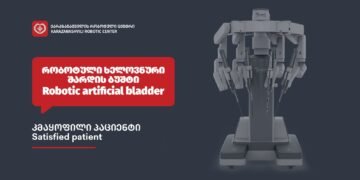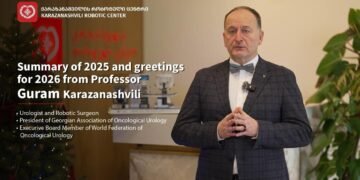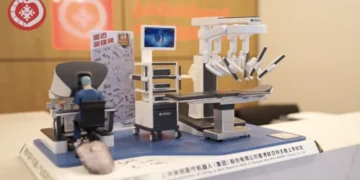Prostate Cancer Screening and Early Diagnosis – Protocol of the “Karazanishvili Robotic Center”
Prostate cancer is the most common malignant tumor after skin cancer. It is a significant public health issue, and therefore, many countries have developed programs for prostate cancer screening and early diagnosis. Under the initiative of the European Commission, 90% of the male population in Europe is expected to undergo prostate cancer screening by 2025. In this context, we have developed and implemented a prostate cancer screening and early diagnosis protocol in the leading cities of Georgia, which includes a high-tech, accurate, and cost-effective prostate cancer examination for Georgian men. Traditional prostate-specific antigen (PSA) blood tests for prostate cancer screening are now a thing of the past.
Why is prostate cancer screening based on blood PSA tests no longer used?
Traditional prostate cancer screening relies on a single test, which is the measurement of PSA (Prostate-Specific Antigen) in the blood. However, PSA measurement is not a reliable method, as PSA levels can often be “normal” even when advanced prostate cancer is present, or conversely, PSA levels can be elevated without the presence of prostate cancer.
The prostate cancer screening and early diagnosis protocol developed by the “Karazanishvili Robotic Center” is based on the latest technological and scientific advancements and includes three tests instead of just one.
What tests are included in the protocol developed by the “Karazanishvili Robotic Center” for prostate cancer screening and early diagnosis?
- Microscopic ultrasound at 29 MHz
- Measurement of PSA (Prostate-Specific Antigen) in the blood
- Calculation of PSA density (the ratio of PSA levels to prostate volume)
What is Microscopic Ultrasound at 29 MHz?
Microscopic ultrasound at 29 MHz is a “magnifying lens” ultrasound method developed only a few years ago. It is currently used exclusively for diagnosing prostate diseases. This cutting-edge method allows for digital assessment of prostate cancer risk using the 5-point PRI-MUS grading system.
What is the advantage of microscopic ultrasound at 29 MHz compared to traditional ultrasound?
Microscopic ultrasound at 29 MHz allows for the visualization of the smallest structures in the prostate, such as capillaries and tiny glandular ducts. It provides an image that is 300% more detailed than traditional ultrasound.
What is the advantage of microscopic ultrasound at 29 MHz compared to prostate MRI?
Prostate MRI is used for screening and early diagnosis of prostate cancer; however, it is at least twice as expensive as microscopic ultrasound at 29 MHz. In terms of accuracy for detecting prostate cancer, both methods are roughly equivalent. Microscopic ultrasound at 29 MHz takes about 10 minutes and has no contraindications or complications, whereas MRI requires 60-90 minutes and comes with various limitations and potential complications.
The “Karazanishvili Robotic Center’s” recommendation for interpreting the results of prostate cancer screening and early diagnosis tests:
- If microscopic ultrasound results are PRI-MUS 1-2 and PSA < 4 ng/mL: The likelihood of prostate cancer is almost 0%. Therefore, prostate transrectal or transperineal targeted or fusion biopsy is not recommended.
- If microscopic ultrasound results are PRI-MUS 1-2 and PSA is between 4 ng/mL and 10 ng/mL: The likelihood of clinically significant prostate cancer is 4%. A repeat test in 6 months or consultation with a urologist for prostate biopsy is recommended.
- If microscopic ultrasound results are PRI-MUS 3 and PSA density < 0.1: The likelihood of clinically significant prostate cancer is 4.32%. A repeat test in 6 months or consultation with a urologist for prostate biopsy is recommended.
- If microscopic ultrasound results are PRI-MUS 4-5 and/or PSA > 4 ng/mL and/or PSA density > 0.1: The likelihood of clinically significant prostate cancer exceeds 60%. Prostate transrectal or transperineal targeted or fusion biopsy is recommended.
Branches of the “Karazanishvili Robotic Center” across Georgia
Given that prostate cancer is the second most prevalent cancer worldwide, the “Karazanishvili Robotic Center” offers prostate cancer screening and early diagnosis services not only in Tbilisi but throughout the country.
Therefore, men living anywhere in Georgia can visit any branch of the “Karazanishvili Robotic Center” and undergo prostate cancer screening and early diagnosis.

